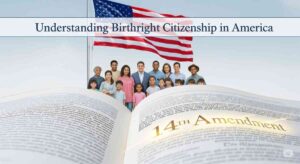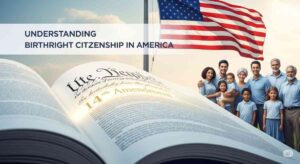Table of Contents

What Does Birthright Citizenship Mean?
In the United States, birthright citizenship refers to the principle that individuals born on U.S. soil automatically acquire nationality, regardless of their parents’ legal status. This legal doctrine — known as jus soli or “right of the soil” — serves to prevent statelessness and promote equal access to citizenship.
The 14th Amendment’s Role
The core of this concept lies in the 14th Amendment, ratified in 1868. It reads:
“All persons born or naturalized in the United States, and subject to the jurisdiction thereof, are citizens…”
This clause was designed to protect formerly enslaved individuals and establish uniform rules for national status at birth.
Explore more at the National Constitution Center.
How the Supreme Court Has Ruled
Over time, the U.S. Supreme Court has issued rulings that interpret and reinforce the constitutional guarantee of citizenship by birth. These decisions often involve children of immigrants and challenge the scope of the 14th Amendment.
Recent years have seen legal cases that revisit these protections in the context of immigration policy and executive power.
Notable Court Cases That Shaped This Right
United States v. Wong Kim Ark (1898)
This precedent-setting case affirmed that a child born in the U.S. to Chinese parents — who were not citizens — qualified for U.S. nationality under the Constitution.
Trump v. CASA de Maryland
This modern legal challenge reignited debate over executive authority and whether certain birth-based claims to status could be restricted by federal policy.
Louisiana v. Callais
Though not directly about nationality, this case addressed nationwide injunctions and revealed judicial divisions on states’ influence over immigration enforcement.
Find full case summaries at SCOTUSblog.
Donald Trump’s Position and Legal Challenges
Former President Donald Trump proposed ending birth-based citizenship for children of undocumented immigrants via executive order. Legal experts, however, widely argued that such a change would violate the 14th Amendment.
Political figures like Pam Bondi supported this idea, intensifying national debate and legal scrutiny.
What Supreme Court Justices Have Said
Views among current justices vary:
-
Justice Ketanji Brown Jackson emphasizes the original intent of post-Civil War amendments and often supports broad civil rights interpretations.
-
Justice Amy Coney Barrett adheres to textualism and may favor a narrower reading of constitutional clauses in future cases.
Their differing philosophies could shape how the Court addresses challenges to birth-based nationality.
The Role of Nationwide Injunctions
Nationwide injunctions allow federal judges to block policies with national effect. These court orders have become instrumental in preventing the enforcement of regulations that may impact individuals’ claims to U.S. citizenship.
While effective, they remain controversial — raising questions about judicial overreach and federalism.
Read more from Brookings Institution.
How Other Countries Handle Citizenship by Birth
Globally, unconditional citizenship by birthplace is becoming rare. Here’s how a few countries compare:
-
Canada: Offers birthright status similar to the U.S.
-
Germany: Follows jus sanguinis — “right of blood” — requiring at least one citizen parent.
-
United Kingdom: Grants status only if a parent is legally settled.
-
Japan: Nationality is inherited through parentage, not location of birth.
These differences highlight the uniqueness of U.S. policy in the global context.
Future of Citizenship Law in the U.S.
As legal and political debates evolve, the future of automatic U.S. nationality may come under scrutiny. While any fundamental change would likely require a constitutional amendment, shifts in judicial interpretation remain possible.
The conversation will continue to be shaped by court decisions, public opinion, and legislative priorities.
Conclusion
The principle of being recognized as a citizen by birth is deeply embedded in American legal tradition. Yet, like many foundational rights, it faces challenges in a politically divided climate.
From courtrooms to Congress, the fate of this policy will depend on how the nation balances constitutional guarantees with contemporary immigration pressures.
✅ Internal Links
✅ External DoFollow Links
Frequently Asked Questions About Birthright Citizenship
What is birthright citizenship?
Birthright citizenship is the legal right to citizenship for all individuals born in a country, regardless of their parents’ citizenship or immigration status. In the United States, it is guaranteed by the 14th Amendment of the Constitution.
Is birthright citizenship in the Constitution?
Yes, birthright citizenship is established in the 14th Amendment of the U.S. Constitution. It states that all persons born or naturalized in the U.S., and subject to its jurisdiction, are citizens of the United States.
Can birthright citizenship be revoked?
Currently, birthright citizenship is constitutionally protected and cannot be revoked by executive order or legislation without a constitutional amendment. Any attempt to alter it would require a major legal and legislative process.
What countries have birthright citizenship?
Countries that offer birthright citizenship include:
-
United States
-
Canada
-
Mexico
-
Argentina
-
Brazil
Many European and Asian countries do not offer unconditional birthright citizenship.
What did the Supreme Court say about birthright citizenship?
The Supreme Court affirmed birthright citizenship in the landmark case United States v. Wong Kim Ark (1898), ruling that a child born in the U.S. to foreign nationals was still a U.S. citizen under the 14th Amendment.
Did Donald Trump try to end birthright citizenship?
Yes, former President Donald Trump proposed ending birthright citizenship through an executive order, but legal experts widely agree that such a move would violate the Constitution without a formal amendment.
What is the difference between jus soli and jus sanguinis?
-
Jus soli (“right of the soil”) means citizenship is granted based on birthplace — the foundation of birthright citizenship in the U.S.
-
Jus sanguinis (“right of blood”) grants citizenship based on a parent’s nationality — commonly used in countries like Germany or Japan.
Has the Supreme Court ruled on birthright citizenship recently?
While the Supreme Court hasn’t overturned birthright citizenship, it has heard related cases, such as Trump v. CASA de Maryland, which challenged immigration-related policies. These cases indirectly impact how birthright rights are interpreted and enforced.
Could the 14th Amendment be changed to remove birthright citizenship?
Theoretically, yes. To remove or change birthright citizenship, a constitutional amendment would be required. This process is complex and demands approval from two-thirds of Congress and ratification by three-fourths of the states.
Why is birthright citizenship controversial?
Opponents argue that birthright citizenship encourages illegal immigration and “birth tourism.” Supporters believe it upholds equal rights and prevents statelessness. The controversy lies at the intersection of immigration, constitutional law, and civil rights.
Final Thoughts
Birthright citizenship remains one of the most constitutionally protected, yet politically contested, civil rights in America. As the nation continues to grapple with immigration reform, the question of who is “entitled” to citizenship will persist at the forefront of legal and public discourse.
